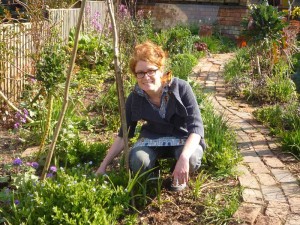Gardeners are being urged to create bee-friendly gardens and play their part in safeguarding these threatened pollinators.
UK bees have declined in recent years and Friends of the Earth’s Bee Cause campaign has teamed up with writer and broadcaster Alys Fowler to offer gardeners top tips to help the UK’s rapidly declining bee population this Easter.
Friends of the Earth is also urging gardeners to avoid insecticides containing chemicals linked to bee decline (neonicotinoid insecticides called imidaclopird and chlothianidin). In recent weeks Friends of the Earth has revealed that numerous leading home and garden centre companies – including B&Q, Homebase, Wyevale, Dobbies and Notcutts – have taken steps to remove items containing these chemicals from their shelves.
Alys Fowler said: “Gardens are becoming one of the most important refuges for both wild and honey bees. They offer a source of chemical free food, clean water and somewhere to nest. In return they will pollinate your fruits and vegetables, giving you more strawberries, apples and tomatoes to eat!
“The more pollinators you attract, the more other beneficial insects and wildlife will move in, helping your garden to find its natural balance. When the balance is right, there is no such thing as a pest problem meaning less work for you”.
Friends of the Earth’s Executive Director Andy Atkins said: “Green-fingered gardeners are usually green-minded too, so if the weather allows them to get out this weekend, we hope they’ll make their gardens bee-friendly and help safeguard these crucial pollinators.
“But we need the Government to take action too by introducing a Bee Action Plan to protect bee populations from all the threats they face.”
Alys Fowler’s top tips for Easter
- Planting nectar and pollen rich flowers will help you and the pollinators. Crimson clover, (trifolium incarnatum) will please the bees and increase soil fertility through its nitrogen fixing roots.
- Lacy phacelia (phacelia tanacetifolia) is a green manure that if left to flower will bring hordes of bees. Once it has finished flowering but before it goes to seed you can dig it in to improve the fertility of your soil.
- Allow edibles like coriander and rocket to flower, these are attractive to bees and once pollinated you can collect seed to sow for next year.
- Provide a clean source of drinking water for bees. A shallow bowl with a few pebbles in the middle so the bees can rest and sip water is all that’s needed.
- Wild bees need nesting sites, somewhere dry and warm. Bundle together some old stems of stuff like Jerusalem artichokes or bamboo canes south west facing out of prevailing winds.
[otw_is sidebar=otw-sidebar-1]




